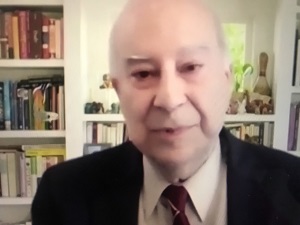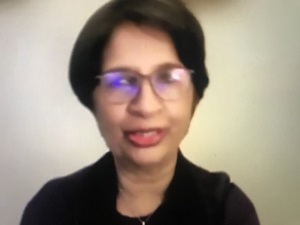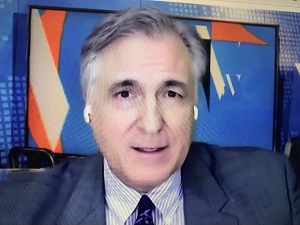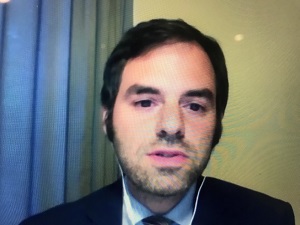Former Ambassadors Ponder What’s Next for Pakistan and India
By Elaine Pasquini

Washington: On the 75th anniversary of the partition of British India into the independent countries of Pakistan and India, the Wilson Center’s Asia Program hosted Nirupama Rao, former Indian ambassador to the United States and China, and Dr Akbar Ahmed, professor of Islamic Studies at American University and a former High Commissioner (Ambassador) of Pakistan to the United Kingdom and Ireland, to assess the current relationship of the two countries. Both ambassadors today are Wilson Center global fellows.

Amb Akbar Ahmed |

Amb Nirupama Rao |

John Milewski |

Michael Kugelman |
John Milewski, director of digital programming at the Wilson Center, served as co-moderator of the program with Michael Kugelman, deputy director and senior associate for South Asia at the Wilson Center.
Opening the discussion, Kugelman noted that India’s scaled up defense cooperation with the US and the resulting major inflows of US weapons and defense technology into the country has increased Pakistan’s concerns about the need for strategic stability in the region. At the same time, he pointed out, Pakistan is deepening its ties with China which troubles India because it views China as its biggest strategic and long-term rival. In addition, the power of social media serves as a “toxic multiplier of the hateful words coming from hardliners on both sides,” he added.
Kugelman also emphasized, however, that the Pakistan-India relationship is not a story of constant hostility. Over the first 18 years post-independence the countries signed 14 bilateral agreements related to trade facilitation, he said. And there has been some cooperation over water-sharing tied to the Indus water agreement. The two countries have also assisted each other during natural disasters, while, most recently, a new border truce concluded between India and Pakistan last year helped lower tensions slightly.
Because of the withdrawal of US forces from Afghanistan last year, the US lens on South Asia may be more narrowly focused, specifically revolving around deepening relations with India, Kugelman said. “That has been a major priority because the core US foreign policy goal these days is to focus on the competition with China, and, in Washington, India is viewed as a key partner to enlist in that effort.”
India, Rao said, has “built a kind of romance around division and we remain fixated on the differences that exist between India and Pakistan, not so much on the history that we share or all that united us before partition or the rich common history.”
As newly sovereign states in 1947, Rao continued, India and Pakistan attempted “very consciously and seriously to manage that relationship in a way that would address these divisions and enable the strengthening of institutions within each country that would be able to deal with governance and statecraft.”
But, presently, the vocabulary of the India-Pakistan relationship “is very much driven by the vocabulary of Cold War politics,” Rao lamented. “We have to understand that peacebuilding between the two countries, which is what we need, should include the sense of loss and vulnerability that both countries have essentially paralyzed over the years about this very difficult fractious history of the relationship.”
The dilemma, Rao contended, is how to create a sense of “wholeness about this history and our common heritage and about our common future.”
“This is a troubled landscape that seems hopeless in some ways,” she said. “I hope that will not be the situation when we speak about it in a few years. We have to keep the lights on and work to disprove the prophecies that we are living on borrowed time. We have to continue to sweat for peace.”
Ahmed was four years old when his father, a British civil servant, uprooted his Muslim family from their comfortable life in Delhi to relocate to Karachi.
Knowing that India was a bigger nation than Pakistan and living under a feeling of hostility inspired him to reach out to friends, enemies, and others to try to learn why there was so much hate and to eventually become involved in interfaith dialogue.
In recognition of his lifelong efforts on peacebuilding, the Gandhi Memorial Center in Washington, DC awarded Ahmed its first Fellowship of Peace Award in 2004.
Ahmed urges South Asia leaders “to sit down with the will and resolution to start solving problems. If not for themselves, for the next and the next and the next generations.”
The younger generation is making an impact, Ahmed pointed out. “They have great fervor, great enthusiasm for Pakistan and the will to make Pakistan what it always wanted which is to be a viable, great nation in Asia, but there is so much hatred on a subcontinental level which is constantly building.”
The professor would like to see the rich mutual legacy of India and Pakistan be taught in each other’s schools. “We have a great interweaving of cultures which the current leaders of South Asia are busy pulling apart,” he stated.
“I have talked to hundreds of Pakistanis of all ages and economic and social groups,” Ahmed said. “They all want to get on with their lives, want to have a normal life. They are aware of the problems and crises within the country but looming over everything is India – a large neighbor of 1.2 billion…and constantly threatening.”
“Seeing how Muslims are being treated now in India is what drives Pakistanis to support democracy,” he continued. Pakistanis are very committed to the idea of democracy, but, with respect to the army, “even the most democratic Pakistani says that the army is what is ‘shielding us from India,’ ” he emphasized.
Ahmed stressed the need for Pakistanis and Indians to respect each other. “We need…some sophisticated understanding of the other side if we are to really move ahead,” he said. In speaking like this to both Pakistani and Indian students in his classroom, he noted: “I get positive results.”
(Elaine Pasquini is a freelance journalist. Her reports appear in the Washington Report on Middle East Affairs and Nuze.Ink.)

